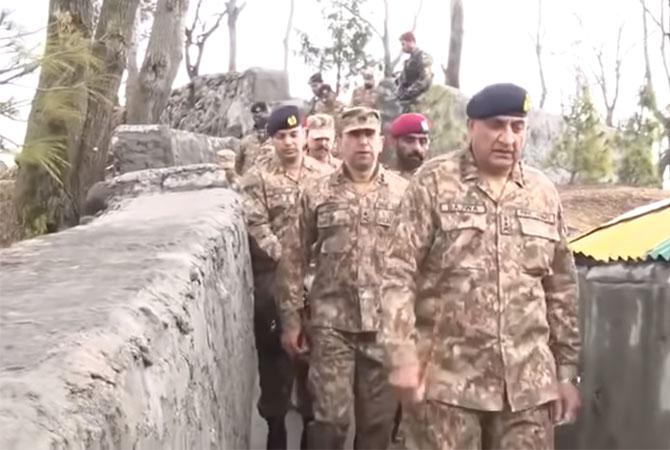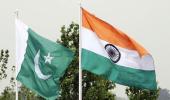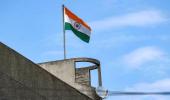General Bajwa, unlike many of his predecessors, believes the Pakistan army's long-term interests lie in reducing tensions with India, reports Ajai Shukla.

With attention focused on the partial disengagement of Indian and Chinese troops from a nine month-long confrontation in Eastern Ladakh, a surprise joint statement from the Indian and Pakistani armies last Thursday announced a ceasefire on the 776-kilometre Line of Control that divides the former state of Jammu & Kashmir into Indian and Pakistan-controlled parts.
The joint statement said: “Director Generals of Military Operations (DGsMO) of India and Pakistan held discussions. Both sides agreed for strict observance of all agreements, understandings and cease firing along the Line of Control and all other sectors with effect from midnight 24/25 Feb 2021.”
With 90,000 Indian troops locked in confrontation with Chinese troops since last May, there has been apprehension that Pakistani troops could join forces with China to impose a two-front war on India. However, foreshadowing an easing of tensions with Pakistan, India's army chief, General Manoj Mukund Naravane, waved away such speculation.
Asked in Delhi about Pakistani collusion with China, General Naravane stated: 'There were no overt signs of any such collusion. Whatever they (the Pakistanis) were doing, they continued doing. There were no large-scale mobilisations or any such activity which would be suggestive of any kind of help being given by one to the other.'
The joint statement also stated 'that existing mechanisms of hotline contact and border flag meetings will be utilised to resolve any unforeseen situation or misunderstanding'.

Officially, Indian and Pakistani troops remain bound by a ceasefire agreed at the end of 2003. However, that is now a paper agreement with cross-LoC firing sharply increasing over the years. The government reported to Parliament earlier this month that 5,133 ceasefire violations (CFV) took place along the LOC in 2020, killing 46 persons.
The 2003 ceasefire was not officially repudiated even in September 2016, when the Indian army launched multiple commando raids across the LoC on terrorist camps in Pakistan occupied Kashmir in retaliation for the deaths of 19 Indian soldiers at the hands of four Pakistan-backed terrorists in the border town of Uri in Jammu and Kashmir.
The ceasefire officially remained in place even through Indian air strikes on a terrorist camp in Balakot, in Pakistan's Khyber-Pakhtunkhwa province in February 2019, in retaliation for the killing of 46 Indian policemen in a suicide attack that was believed to have originated in Pakistan.
Negotiations for the ceasefire were carried out mainly behind the scenes, between India's National Security Advisor Ajit Kumar Doval and Moeed Yusuf, Pakistan Prime Minister Imran Khan's special assistant for national security and strategic policy planning.
In an audio statement that was released in Islamabad, Yusuf termed the ceasefire as a 'very solid and positive' development that justifies the success of Pakistan's Kashmir policy.
In fact, the crucial driver of Pakistan's outreach has been its Chief of Army Staff General Qamar Javed Bajwa who, unlike many of his predecessors, believes the Pakistan army's long-term interests lie in reducing tensions with India.
Soon after taking over as COAS from the hawkish General Raheel Sharif, Bajwa sent an unprecedented back-channel message to the then Indian COAS, General Bipin Rawat, calling for toning down the temperature along the LoC so that he could rein in hotheads in the Pakistan army.
Pakistan army sources describe the reaction when General Bajwa enunciated his new thinking. On a visit to a forward Pakistani post in late 2016, after being briefed by the company commander on his plans for causing mayhem on the Indian post across the LoC, General Bajwa shocked those present by remarking: 'So will that result in the Pakistani flag flying over the Raj Bhavan in Srinagar?'
With India embroiled in confrontation with China, General Bajwa has restrained Pakistani commanders who argued this was the ideal time to damage India.
Last month, speaking at the Pakistan air force academy, General Bajwa said it was time to extend a 'hand of peace in all directions' and for resolving the Kashmir issue in a 'dignified and peaceful manner'.
With the Indian Army having switched at least four divisions from the Pakistani frontier to the LAC with China, there is greater appetite in New Delhi for General Bajwa's conciliation.












 © 2025
© 2025